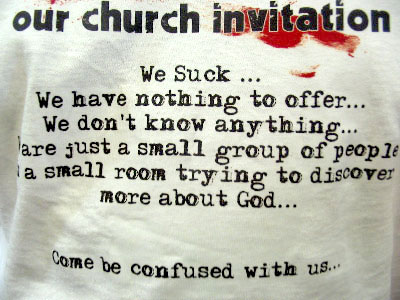
People have wondered how we fellowship at the Shepherds Crook. Let me try and give you a picture:
It is Tuesday, maybe Friday, or even Sunday Night. People are gathered around, some standing, others at easels, some prone on the ground. Many sit in overstuffed easy chairs. Some prefer the sitting like the Buddha, while others choose a favorite yoga position. Some are drinking Chai, others Coffee. The room is dark and fragrant, except for a few candles and some nag champa incense burning. I sit in the middle, and I pose a few questions, attempting to start a conversation, while sipping some green tea. Some may not ant to engage in a conversation. Their worship involves playing a guitar or producing art in some other form. We have several fine musicians, some classical and modernist artists. We even have a young man who does tatoos in the corner.
Our service is not so much about finding a new set of answers, a new way of looking at the Bible, really a new way of being Christians. We really live in a post-Christian world, so our fellowship is an ecclectic blend of Christianity, Buddhism, Wicca, Islam, Hinduism. We have a banner that says COEXIST across the front of our place of fellowship:

We understand that we are part of a global community. We are required to live our local expressions of Christianity in harmony with those around the world. The beliefs and practices of our western church must never override or negate the equally valid and righteous expressions of faith lived by christians around the world. It is essential that we recognize our own cultural version of Christianity, and make ourselves open to the work of God's hand in the global community of faith.
At the Shepherds crook, sermons or messages are not so much about my extracting truth from a text like the Bible to apply to people's lives. In many ways, my sermon or message is less a lecture or motivational speech, rather, it is like free flow poetry. It is putting words around people's experiences to allow them to find deeper meanings in their lives. This is why we contextualize the Bible, because this is a way of doing theology in which we can take into account the spirit as well as the message of the gospel, then we can mix into it tradition, and we add to it our culture and experiences. It is then that we are truly able to understand what it says to us today as opposed to what it said yesterday to someone else.
It is our goal to create a community that looks less like an organized menu and more like a potluck. People eat, and they bring something for others. Our belief is built when all of us engage our hopes, dreams, ideas, and understandings with the story of God as it unfolds through History and through us. We hope that you will join us on our path, engaging in conversation with us.

No comments:
Post a Comment